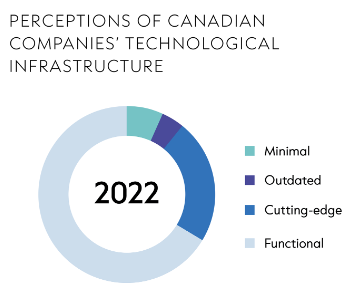
Tech investments by Canadian firms reach lowest in six years
EP&T Magazine
Electronics IT report survey tech TechnologyInflation and labour shortages delay digital transformation activities and slow post-pandemic recovery, according to the latest industry survey
NOVIPRO Group has unveiled its seventh IT Trends report in collaboration with Léger to identify the trends and challenges facing small, medium and large Canadian businesses. This survey highlights the profound influence of socio-economic pressures on organizations, including inflation, which influenced 69% of companies to rethink their technology investment decisions.
Investments disrupted by the socio-economic context
Organizations planning financial commitments to technology are at a six-year low. Three quarters of the respondents (76%) plan to deploy technology investments, compared to 92% before the pandemic in 2019. The study reveals that, in order of importance, inflation, remote work, labour shortages, recession, environmental disasters and international tensions, have turned corporate decisions upside down.
A missed opportunity with AI
While 54% of Canadian companies say they have achieved positive results by implementing advanced data analytics and artificial intelligence, only 13% of organizations plan to invest in these areas within the next two years, compared to 36% in 2019.
The main objectives cited for these major technology investments have a clear impact on labour shortage, namely increasing productivity (30%) and replacing manual tasks with technology (18%). Nevertheless, it seems that companies are delaying their investments because of the current issues they are trying to resolve. Lack of resources (31%) and inflation (21%) are listed among the main obstacles to adoption.

“I’m very concerned to see so many organizations once again postponing their technology investments, significantly slowing desired outcomes on their digital journey,” says David Chamandy, CEO, NOVIPRO Group. “The study reveals that only 38% of companies acknowledge the transformative potential of advanced data analysis and artificial intelligence within the next two years. It appears that they may be underestimating the rapid evolution of this technology and the significant impact it can have on their overall business growth. We firmly believe that those who are swift to invest in these cutting-edge technologies will be the ones best positioned to overcome the challenges posed by inflation and labour shortages.”
A worrying gap in cybersecurity
Companies cite remote working (65%) and labour shortages (56%) as the socio-economic factors that have prompted them to review their security practices the most. Despite this, security solution upgrades are declining. This is reflected, among other things, in the lowest implementation of employee cybersecurity training (59%) compared to 74% in 2019.
At a time when Canada is looking to modernize its consumer privacy legislation with Bill C-27, only half of respondents claim to have a good level of awareness of its impact. The new law will require companies to notify all customers in the event of data theft. Currently, 43% of them do or would do so in the event of data theft. In Quebec, where a more similar law has been in effect since September, only half of organizations (50%) would inform their customers in the event of data theft or a cyberattack.
“Given the speed at which cyber threats are evolving, it is imperative that organizations comply with provincial and federal laws to better protect their customers,” adds Alain Cormier, Executive Director, Business Development, NOVIPRO Inc. “When you consider that one in four companies fell victim to a cyberattack, and that 57% of them paid the ransom, resulting in costs of over $500,000 in 25% of cases, cybersecurity negligence is much more than a matter of reputation.”
The new work reality
This year again, labour shortages and the Great Resignation phenomenon have not spared the IT sector. Attracting qualified resources (37%) and retaining key resources (37%) were the biggest HR challenges for IT, followed by employees changing jobs or careers (36%). For over a third of respondents, these challenges have been exacerbated by the current socio-economic context. What’s more, almost one in two companies (45%) claim to have felt a negative impact of these upheavals on their projects.
When it comes to remote work, only 58% of companies require employees to use a secure VPN remotely, and 33% require them to obtain authorization to download applications/ software to their work tools.
“The majority of cybersecurity solutions such as VPNs, user authorizations and training are easy to implement and do not require a significant cost on the part of employers,” explains Roger Ouellet, Director, Security Practice, NOVIPRO Inc. “It’s disconcerting to see how these measures are not used more widely, as they can make a tremendous difference in terms of data security.”
Provincial differences
- Ontario is the Canadian province whose companies have been most affected by inflation. Only one company in five claims to have felt no impact from the economic turbulence. At the other end of the spectrum, Quebec companies seem to have fared best.
- Of all the provinces, Quebec has significantly more difficulty recruiting for IT positions, while Ontario has the easiest time.
- Ontario has a head start in the implementation of artificial intelligence and advanced data analysis: 63% of companies in Ontario have achieved positive results by starting the transition, compared to 54% in Canada.
Access the full study: https://info.novipro.com/en/it-trends
